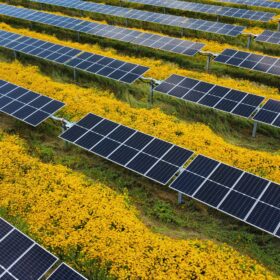While grid-tied battery deployment has been rising in the United States for years, the technology got a big boost by one of the nation’s worst disasters as far as climate impacts go: The Aliso Canyon gas leak.
This leak of nearly 100,000 tons of methane into the atmosphere did not only shoot up California’s greenhouse gas emissions, but also wiped out gas storage, which led to an emergency deployment of large amounts of battery storage. This included some of the world’s largest battery storage systems.
But that was not the end of energy storage deployments in California. Today Powin Energy reported that it has signed a contract with San Diego Gas & Electric Company (SDG&E) to install a 6.5 MW / 26 megawatt-hour (MWh) battery system in Escondido, California. The company plans to supply its Stack140 modular battery system, which comes in 140 kWh arrays.
This follows on Powin’s supply of a 2 MW / 8 MWh battery system for Southern California Edison (SCE) earlier this year, as part of the utility’s response to the Aliso Canyon leak.
Just as California regulators authorized the procurement of energy storage for Aliso Canyon, they must also approve this contract between SDG&E and Powin. This will help the utility reach its mandate to procure 165 MW of energy storage by 2020, with all projects operational by 2024.
Part of the reason for California’s rush to batteries is the need to balance the mis-match between solar PV production and peak demand, which includes a second evening peak after a mid-day peak. Powin’s systems are 4-hour batteries, which is a similar rating to those that Tesla is deploying on the Hawaiian island of Kaua’i to meet evening demand with solar.
Powin didn’t say exactly which applications the battery would be used for, only stating that it would help to enhance grid security and to integrate higher levels of renewable energy.
This content is protected by copyright and may not be reused. If you want to cooperate with us and would like to reuse some of our content, please contact: editors@pv-magazine.com.









By submitting this form you agree to pv magazine using your data for the purposes of publishing your comment.
Your personal data will only be disclosed or otherwise transmitted to third parties for the purposes of spam filtering or if this is necessary for technical maintenance of the website. Any other transfer to third parties will not take place unless this is justified on the basis of applicable data protection regulations or if pv magazine is legally obliged to do so.
You may revoke this consent at any time with effect for the future, in which case your personal data will be deleted immediately. Otherwise, your data will be deleted if pv magazine has processed your request or the purpose of data storage is fulfilled.
Further information on data privacy can be found in our Data Protection Policy.